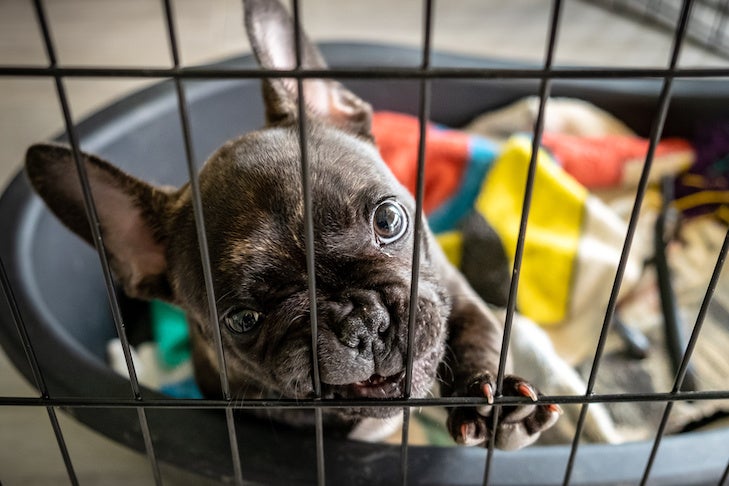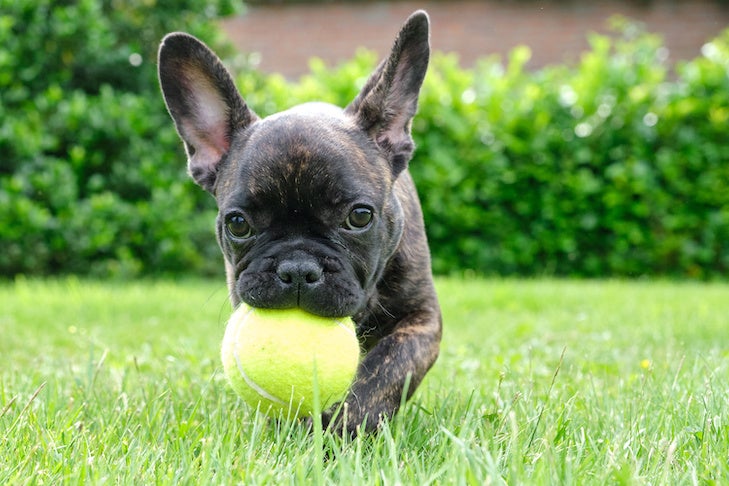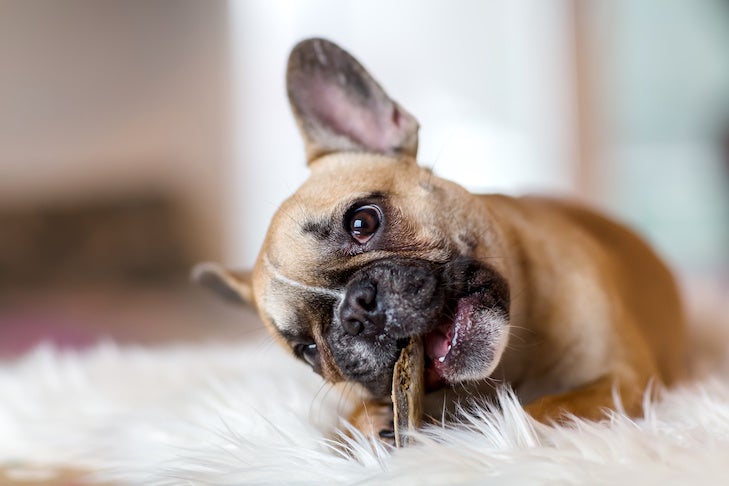
Preparing to welcome a French Bulldog puppy into your home for the first time? Plan on making time for puppy-proofing, training, playtime, and other key activities.
We turned to Sharon Dykes, who is an AKC Breeder of Merit with 25 years of experience, an AKC judge, and a board member of the French Bulldog Club of America, to learn all about the most important milestones families should be ready for during their puppies’ first twelve months of life.
Key Milestones: 12 Weeks
At 12 weeks it’s safe for French Bulldogs to leave their mothers and litters and be placed in your home. When welcoming new Frenchies into your pack, families should be prepared for these first four key milestones, starting right upon getting a new puppy – so when they’re 12 weeks old.
#1: Puppy Proofing
Similar to baby-proofing, plan on puppy-proofing your home before your Frenchie arrives. Dykes likens life with these puppies to living with the average 2-year old toddler.
“Don’t leave them unsupervised,” she says. “Be sure to protect them from themselves. Keep electrical cords and other household dangers out of reach.”
#2: Immunizations
By the time they leave the breeder, French Bulldog puppies should have had a minimum of two puppy vaccines, explains Dykes.
“Different breeders follow different vaccination protocols depending on their veterinarian recommendations, the areas of the country they live in and conditions their dogs are exposed to,” she says. “Your puppy should come to you with a ‘shot record,'” indicating when the next vaccination is due, she added.
Find a vet and schedule the next in the first-year vaccination schedule, and be sure to discuss possible side effects before any subsequent vaccinations.
“Some immunizations can cause side effects such as lethargy, diarrhea, nausea,” says Dykes. “Be aware of what is ‘normal’ and what is not normal.”

#3: Grooming, Nail Trimming, and Bath Time
Frenchies, known for their signature wrinkles, require extra care right from the first day they arrive.
“Wrinkles can allow bacteria and yeast a warm, dark place to grow,” explains Dykes. While a responsible breeder will have already introduced your puppy to “personal hygiene,” she explains that humans should create fun daily routines – “love rituals” – to care for your puppy.
These “love rituals” should include daily brushing to eliminate dirt and loose dander, she adds.
Because Frenchies are short-coated, brushing should take about five minutes or less and the goal is to remove dirt, danger, and spread your dog’s natural oils as a natural conditioner for their coat. The more often you brush, the less you’ll need to shampoo your pet’s coat.
She suggests making it a morning habit, right after the first potty break of the day.
Beyond that, she recommends taking an unscented baby wipe, clean around the tail area, facial wrinkles, and ears.
“Make sure lots of kisses are involved. They will look forward to their morning rituals,” she says. “The tail area can be cleaned with unscented baby wipes throughout the day, as needed.”
Breeders should take care of your puppy’s first nail trim, so ask for a lesson to prepare for routine nail trimming.
“Our standard of the breed calls for nails to be ‘short stubby nails,'” says Dykes. That means humans should be prepared to care for them on a weekly basis, depending on diet, exercise, and overall activity levels.
Similarly, your puppy will have already had a bath with the breeder. Brushing should take of ongoing care, so Frenchie puppies generally only need a bath once a month, depending on diet and overall health. When it’s time, be sure to use a puppy shampoo, not one formulated for human babies.
“Puppy shampoo is gentle and tearless and the correct PH for puppies,” she says.
Be careful of over-shampooing, which can strip the coat of natural oils and result in skin issues.

#4: Learning, Playtime, and Training
Frenchies are, according to the standard of the breed, “active, intelligent…well behaved, adaptable, and comfortable companions, alert, and playful” explains Dykes. And that means, they love learning and will start picking up on things right away.
It’s important to give them activities, she explains, because otherwise they’ll get into their own trouble.
Start with teaching your dog to sit, walk on a leash, and chase a ball in exchange for cuddle time and treats.
These activities may later lead them to try out lure coursing or agility.
“Just remember this is a puppy,” she adds. That means their joints are developing and not mature. “Strenuous running and jumping should wait until they are at least eight months and up to a year.”
“Because of their ritualistic nature, Frenchies can be very easy to train,” says Dykes. “You must simply train yourself. Set a schedule and stick to it. If you are not consistent, it will be harder to train your puppy.”
Let these training activities begin as soon as you welcome your puppy into your home. And start off with good habits. Because of their ritualistic nature, Frenchies are creatures of habit.
“Do not teach them one set of rules as a puppy and then try and change it up later,” she explains. “For example, if you let that cute little baby in your bed, plan on sleeping with it as an adult dog the rest of its life! If you want the dog to sleep in its own bed teach it that from the beginning.”
Key Milestone: 4-6 Months
At this stage, it’s all about teething. Expect 28 baby teeth to fall out and 42 adult teeth to come in around this two-month timeframe.
“The process can be uncomfortable, just like with human babies, and just like with human babies, relief is often obtained by chewing on everything,” says Dykes. “To protect your puppy, and your furniture, provide things that are appropriate for them to chew on and keep them busy.”
Some puppies may even experience an upset stomach at this time, just like human babies. “Be prepared for slight nausea or slight diarrhea,” she explains.

Key Milestone: 6-8 Months
During this two-month time period, expect your puppy’s hormones to kick in. To prepare for this time you should have already discussed spaying or neutering options with your breeder and vet.
“Hormones can affect activity levels and temperament, so watch for possible changes,” says Dykes. Female dogs may act more clingy than usual, experience swelling of the vulva, or have urinary accidents, even if they’re potty trained.
Males may start marking more often and “humping.”
“Some pups will try to establish their place in the ‘pack’ if you have more than one dog in the home, resulting in toy or food stealing, and possibly bickering,” she adds.
Since your dog will be more developed, this is a great time to start more advanced training, including puppy obedience.

